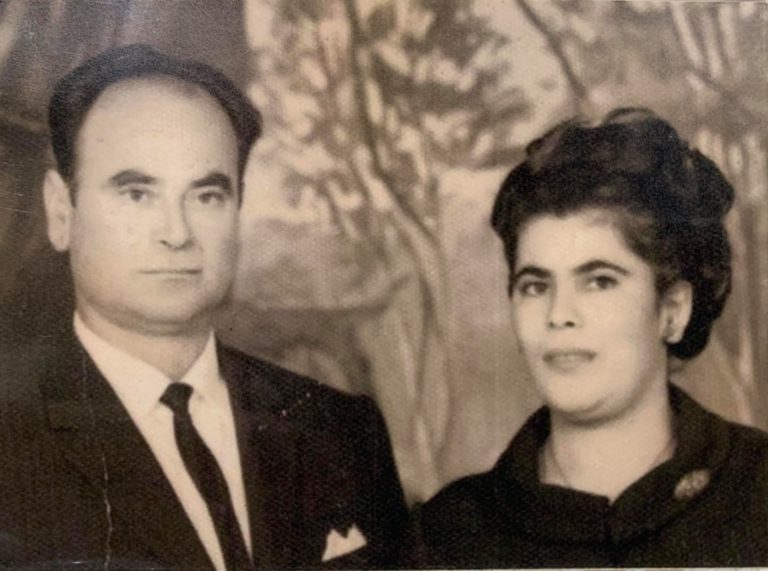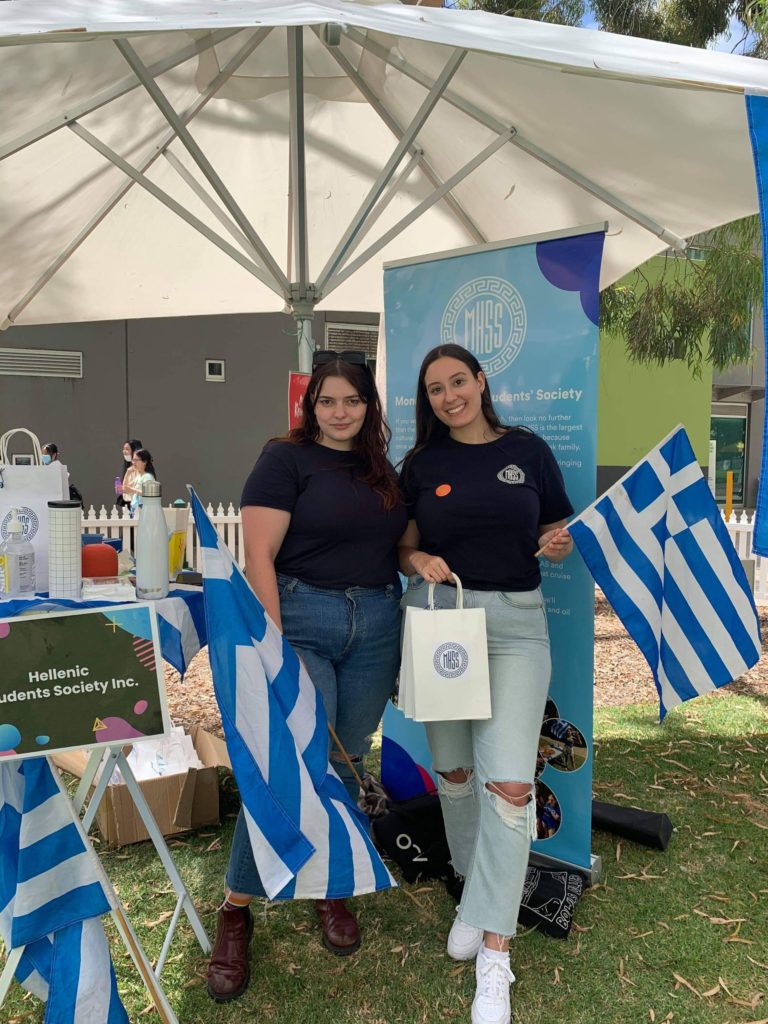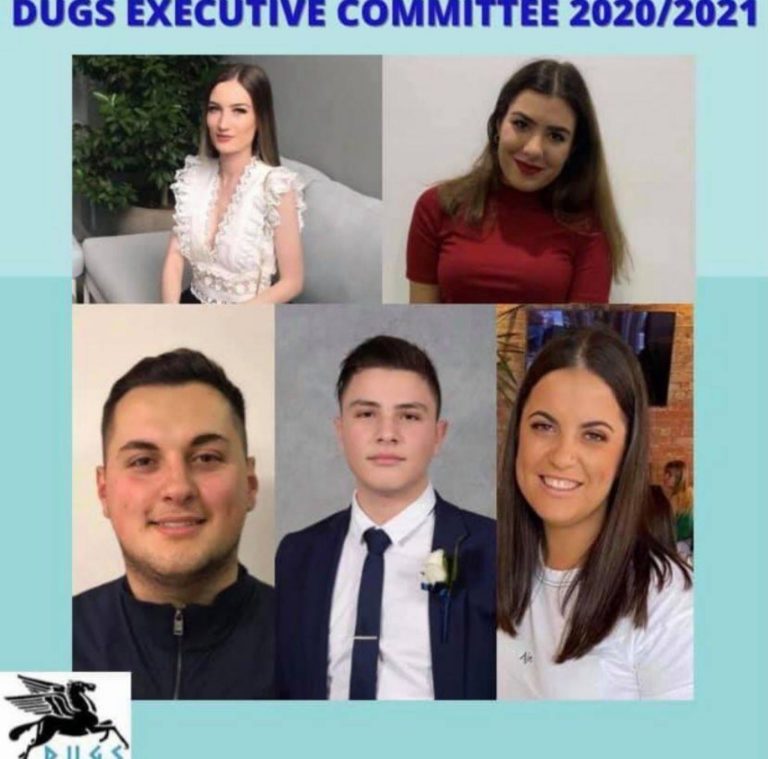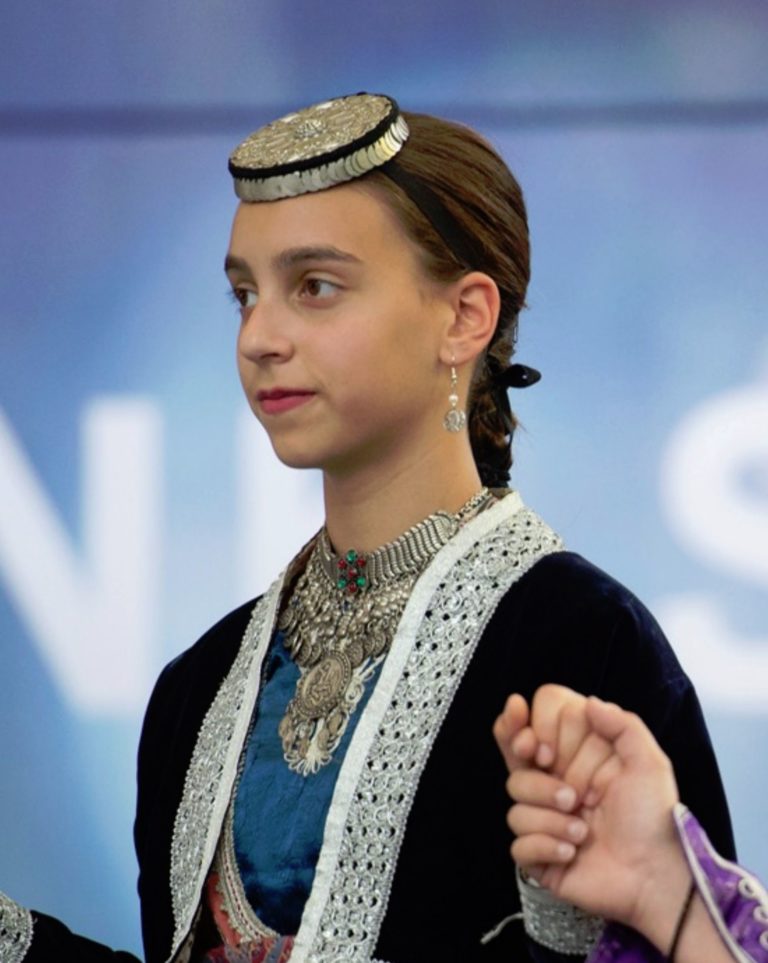As 25 March falls upon us every year, thousands of Greek-Australians across the country take a moment to reflect and thank those that came before them for the great sacrifices they made to gain independence for Greece.
This year marks 200 years since the 1821 Greek Revolution. For many, this would be a time of year where those with Greek heritage, young and old would take to the streets of their cities to commemorate Greece’s break from Ottoman rule with a march.
Unfortunately, there are still restrictions in place for many cities due to ongoing COVID precautions and people will have to wait before they can make their way to a ‘parelasi’. The Greek spirit however does not falter despite the cancellations and so Greek youth share what the 1821 Greek Revolution means to them in the modern age and find ways they can continue honouring their ancestors who brought upon Greek independence beyond marching.
READ MORE: Marching through the ages: Photos of celebrations past and present
George Karantzalis – Member of the Cretan Brotherhood Youth

My late grandparents migrated to Melbourne in the mid 1950s from a village in Sparta called Krokees (Levetsova). Like many Greek migrants, they sacrificed and left everything behind in hope to start a new life in a foreign country. They brought with
them their rich culture, faith and filotimo.
I never had the chance to meet my late pappou as he had passed away when he was only 50 years old, leaving my late yiayia widowed for almost half of her life. My Greek identity has been strongly influenced by my late yiayia Panagiota, who in my eyes was a hero and a great inspiration representing what a strong Maniot Spartan woman is. Growing up with my yiayia I was taught to speak Greek more fluently than English and I learnt so much about our Hellenic culture and way of life.
The true inspiration though, is knowing the battles our ancestors faced to ensure myself, and other Hellenes were here today. I am proud to say that my direct ancestor was Kapetan Zacharias Barbitsiotis, who was a Greek klepht in the Peloponnese during the final decades of Ottoman rule over Greece.
Their generation underwent a multitude of hardships and sacrifices for their children and grandchildren to live a better life. Without their hard work and passion, we would not have our community clubs, brotherhoods and churches in Greek populated areas and even in rural Australia where you would not expect to find a Greek Orthodox Church.
Greeks in history have endured so many genocides, occupations, and wars yet they still kept and preserved our culture. Had they not held onto their 400-year dream of freedom from slavery, most of our culture, our language and our Greek Orthodox Christian faith would not exist.
This was the first time a Christian country had achieved independence from the Ottoman rule and established a fully independent state, recognized by Europe. On that historic day in 1821, the day of the Annunciation of the Virgin Mary in the Orthodox Church, Greeks of all ages, men, women, and children revolted against Ottoman Turkish colonists occupying our homeland, they said “Enough was enough.”
The Hellenes of this generation can preserve our culture by remaining involved in our local Greek community clubs, social groups, schools and churches. There are many things in our community which promote Greek culture and it is up to the individual to seek what interests them; whether it be speaking or learning the language or even listening to Greek music.
Everyone’s journey begins somewhere.
Olympia Nelson – Member of the Panmacedonian Association of Melbourne and Victoria

My generation doesn’t easily express enthusiasm for armed conflict. I know that the Greek War of Independence was necessary for Greek autonomy and different to many other battles; but as a people blessed with peace, we grow up with a moral reflex that’s suspicious of militarism and patriotism. Even when a campaign was worthy, the topic seems so daunting and forbidding that we unconsciously avoid thinking about the trauma of war.
That’s why I was eager to hear a lecture by Professor Vrasidas Karalis, a moving and commanding presentation last week for the Greek Community of Melbourne, on the momentous and defining year of 1821. It helped me understand how best we—as 3rd generation Greek-Australians—can reimagine this significant year, while simultaneously honouring the resilience of our nineteenth-century forbears. I wondered what this complex social uprising should mean for Greek-Australian youth, and that’s what drew me to attend the seminar where I was astonished to find well-hidden dimensions of the formation of the Greek psyche or ethnos: a people who don’t just speak Greek but who also understand the diversity of Greek authenticity.
Beyond attending marches, we ought to consider critically the meaning of the achievements of our ancestors, to recognise what the revolutionaries were up against and how they formed a social organisation that was cohesive and visionary, how they favoured democracy and acted prudently as well as bravely. For example, they realized that the original template of the French revolution could not be emulated, because it would be a cultural travesty to follow the aggressively secular trajectory of the rationalist revolutionary France. The new Greece would have to honour all the traditional community values—which included religious attachments—and not just a single ideology.
Prof Karalis revealed how important it is to approach 1821 historiographically and to be curious about it, thinking not just about what happened but what might have happened. He drew attention to the first draft constitution, which he described as so beautifully idealistic that it could never be realised in a pragmatic world. Rather than using the Revolution simplistically to cultivate patriotism, we need to study it for its early spread of options, to question its underpinnings and to understand its long term consequences. We cannot afford to be incurious about the various competing ideals, because they still survive in contemporary Greece. So the worst response to the celebrations would be simply to succumb to chauvinism and jingoism.
This approach also helps us to think of Greece as a modern and progressive nation that can be tolerant and capable of enrichment through contact with the rest of the world. With this in mind, the multiplicity of the Greek identity should be recognised, one which is inclusive of identities ranging from central, regional, national, sexual to religious (also comprising Catholics, Jews and Muslims, remembering of course that not all Greeks are Orthodox) alongside many other multiple identities that Professor Karalis so beautifully articulated.
Monash Hellenic Student’s Society Committee, 2020-2021

200 years on from the 1821 Greek Revolution, young Greek Australians, such as we the members of the Monash Hellenic Students’ Society (MHSS), find ourselves almost 15,000 km away from Greece but we nevertheless remain determined to stay connected to the history and culture of our ancestors.
For the members of the MHSS community, the 200-year anniversary is a moment to reflect upon the core principles of our shared Greek identity: freedom, strength and independence. It is an inherent part of Greek identity to be proud of our vibrant culture, as we continue to share it with the Monash community. We are reminded that although the Greek nation’s independence is only 200 years old, our history extends to the beginning of European civilisation. This year, we invite young Greek Australians to use the 25th of March to remember the sacrifice and bravery of the revolution’s fighters, and remind youth that the preservation of the Greek culture and history is at the core of Greek identity.
As second and third generation Greek-Australians, there are many ways we continue to honour our ancestors who fought for and delivered Greek independence. It remains important that we continue to participate in commemorative traditions such as parelasis, but there is more we can do, and continue to do, to honour these fighters.
The everyday actions of cementing our Greek identity – such as engaging with traditional dances and modern Greek music – all continue to honour these forbearers by ensuring the continuation of the Greek identity. We are proud of the identity they fought to protect, and honour them in our dedication to spread Hellenic culture in the Monash and wider community.
Passion is at the core of Greek identity, and Monash Hellenic is dedicated to sharing this passion through the Greek language, traditions, and continuing our connection to the Greek nation. We are passionate about promoting Greek language through our Casual Conversation Club, our culture and history through our social media initiatives, and we take pride in our role in building a network of Hellenic youth.
By providing an avenue to all members of the Greek community at Monash to discover and explore their Greek identity, we continue the legacy of our ancestors who fought for revolution. No matter how Greek you are, the 25th of March commemoration is your history to share in.
Deakin University Greek Society (DUGS) Executive Committee

The 1821 Greek Revolution created a positive change by influencing a model of creating self-determined nations and states. It didn’t just affect Greece but more broadly the whole of Europe. Greece gained its political, administrative, and commercial rights all of which constituted independence. It created a sense of national identity.
In 1821 it was recorded in the pages of world history as the revolution that largely determined the course and evolution of the European continent. A revolution that started from the poor quickly gained popularity and was the spark the ignited the flame of the Greek Revolution. The revolution of 1821 teaches us that the struggles of the peoples against all forms of exploitation, injustice and authoritarianism can be a force that moves history forward and can defeat opponents who seem powerful.
There is still currently a strong patriotic Hellenic influence in second and third generation Australian Greeks. There are Greek festivals, nightlife, tavern nights, university societies to name a few, all which uphold the Hellenic value of unity. Greek music is a strong tool which expresses and maintains the honour of that second and third generation Australian Greek have for their ancestors. Greek food is highly rated and a cultural sensation.
Hellenic culture is present in today’s society and the youth enjoy and are proud to be Greek. Today’s national anniversary reminds us that unity and solidarity have always been the great weapons of Hellenism and from these brilliant examples we must draw strength and determination to justify our own struggle to end the occupation and reunification of our country.
George Nikolakopoulos – Member of National Union of Greek-Australian Students (NUGAS)

The Greek Revolution of 1821 stands as the ultimate display of heroism and love for Hellenism. The fact that thousands of Hellenic and non-Hellenic people alike were willing to lay down their lives to simultaneously preserve and revive the Hellenic culture and way of life fills me with an immense pride and love for Greece. I have fond memories of learning about the events of the Revolution during Greek school and having my curiosity for Greece and its history ignited within me; something that still burns strongly today.
As a third generation Greek-Australian, I feel as though we are unique in our existence. Whilst we arguably still have strong ties to Greece through growing up with our giagiades and pappoudes who were born there and blessed us with their first-hand accounts, we have simultaneously been born and raised in a multicultural country such as Australia where our identity can’t necessarily be seen as the same as the first generation Greeks. For this reason, I feel as though whilst we are unable to honour our ancestors in the traditional way this year, there are many other ways to pay our respects apart from going to the parelasi.
We, as third generation Greek-Australians, are able to honour their legacy in many more ways by simply holding onto whatever it is that makes us feel the most ‘Greek’. Whilst that may sound quite nonspecific and would differ from person to person, this is the best way that we will be able to preserve Hellenism and ultimately honour the legacy of our ancestors.
As an individual, I am able to speak the Greek language, enjoy the music, dance the dances, cook/eat the food and participate in the events that are run in the Greek community. This is my way of keeping alive the culture that my ancestors died for and is something that I will in turn be able to pass onto my children in the future. Similarly, I have met others who participate in the same traditions as myself but are unable to speak the language. While they may not be able to fully embrace all aspects of Hellenism, they still try their best to embody everything that our ancestors fought for and honour them in their own way.
Our very existence as a race and culture is directly attributable to our ancestors who fought and died for what they believed in. It is for this reason that holding onto and identifying with even one thing that connects us to Greece is the ultimate display of respect that we, as third generation Greek-Australians, can show to our heroic ancestors. This in turn will be passed onto future generations to ensure that their sacrifices are never forgotten.
Kion Sapountzis – President of Melbourne University Greek Association (MUnGA)

Greek independence is important to all of us. Our heritage has lived through the lives of our parents and grandparents here in Australia. For us younger Greek Australians, soon enough, it will be our turn to continue to uphold those same traditions which have been bringing together our communities for decades.
The 25th of March is a time of ethnic celebration. From dancing and marching, to lectures and fetes, the Greek culture continues to spread its connection to the wider community. It is up to us younger Greeks to continue these traditions. Nowadays, younger Greek committees, Greek university clubs, dance groups, music bands and many more organisations are doing their part to continue those same traditions.
As young Greek Australians, we owe our heritage here to those Greeks, who generations ago migrated here. Although we are able to celebrate our Hellenic identity, the fight for our ethnic freedom continues even after the Greek independence of 1821. If we continue to celebrate our identity and traditions here, then the fight for Hellenism all those centuries ago still holds its value today. However, if we let our Greek identity become merely tokenistic, as a way of identifying each other instead of an active celebration of who we are, then our independence which our ancestors fought for loses its significance in our modern Greek culture.
Through my involvement with Greek clubs and Greek Australian youth, I aim to celebrate and share our heritage both on and off campus, to Greek Australians and Philhellenes. By sharing the stories and traditions of our ancestors, we continue to honour their impact on our modern society, representing the significance of their struggles to achieve independence to this day.
If you are looking to celebrate Greek independence, then celebrate our history, our culture, and our way of life, by continuing to contribute to those Greek communities around us. Only through this does our Greek heritage remain alive and thriving, even throughout the next 200 years.
Tania Koumanelis- President of Victoria University Greek Society (VUGS)

I was fortunate enough to grow up in a household that was extremely proud of its heritage. We spoke the language, saw our giagia and pappou every other day, attended church, ate traditional Greek food, and we were encouraged to completed Greek school through to VCE.
When I attended Greek school and learned about the Ottoman occupation of Greece and the Greek Revolution of 1821 and all the famous figures who played a role in its success, I felt an overwhelming sense of pride in my background which ignited my interest in learning more about our rich and complex history.
I feel we can learn a lot about persistence and patriotism from our forefathers who were unable to express their love for Greece and the Greek language under Ottoman occupation, yet still managed to hold on to the culture, religion, and language of their people for generations upon generations and somehow fought an entire revolution and still managed to come out speaking their native tongue and holding on to their traditions.
This is truly a feat I think we as second, third and future generations of Greek Australians can aspire to live up to and try hold on to the traditions and language of our people regardless of whether we are in the motherland or not.
To achieve these aims of retaining culture and language there needs to be a conscious effort to attend and send our children to Greek school to learn our language, customs, and traditions. We must also continue to gather recipes and stories from the older generations of Greeks to pass on to our own kids one day, so they can appreciate all that our ancestors fought for and wanted us to have; and that is great pride in our unique language, culture and traditions.
Martha Stamatopoulos – Dancer with the Central Pontian Association of Melbourne and Victoria (Pontiaki Estia)

March 25 reminds me of my Greek heritage and the feeling I get when marching through the greenery of the city gardens in front of the Shrine of Remembrance, an annual event I always participate in. Whenever I march, I wear my traditional Pontian costume with pride as I take in the senses around me. I can feel the cool breeze as I hear chatter of young children and adults alike, from different communities gathering in remembrance of the brave men and women who fought for Greece’s independence during the Greek revolution which began in 1821. Without their deep pride for a nation that has given so much to the world since antiquity, Greece would not be the independent nation it is today and we would not be Greek, but descendants of Turkish citizens.
It is always wonderful to see so many young people from different Greek schools, clubs and organisations march with their flags down the path leading up to the Shrine. One year my pappou was one of the officials that we saluted at the end of the march as we walked past the shrine – it was all very exciting.
I remember one year where I practiced marching in the yard of my Greek school in the build-up to the big day. We wore blue and white, the colours of the Greek flag, representing the ocean and sky; its 9 lines of blue and white stripes each representing the nine syllables of the phrase which translates to ‘freedom or death’ – the pinnacle of Greek independence and national pride.
Without those ‘kleftes’ who were prepared to give their life to free their country and their fellow patriots from the oppressive practices of the Ottoman Turks, had they not had the courage to endure the harsh conditions of the mountain ranges, we wouldn’t have a Greece to proudly march for, a Greece that was home to my grandparents, that was the country of the language I learn today and the reason why I am a bilingual student with such a rich heritage.
It’s a good feeling knowing that I have the privilege of not just living in what is known as ‘the lucky country,’ Australia, but to also have the privilege of being Greek, knowing that I can speak the language to my grandparents, knowing that I can have a passport that says ‘Greece’ on it, knowing that I am part of a unique community with unique cultural traditions, knowing that it has brought me friendship and pride and shaped who I am. On the 25th of March, I think of all these things that shape each one of us who are Greek, whose ancestors have connections to a land rich with history and knowledge.









